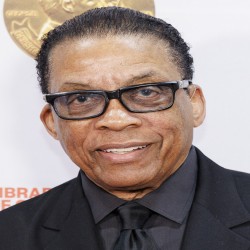
Herbie Hancock
American Jazz Musician and Bandleader
| Date of Birth | : | 12 Apr, 1940 |
| Place of Birth | : | Chicago, Illinois, United States |
| Profession | : | Jazz Musician, Record Producer, Bandleader |
| Nationality | : | American |
| Social Profiles | : |
Facebook
Instagram
|
Herbert Jeffrey Hancock is an American jazz musician, bandleader, and composer. Hancock started his career with trumpeter Donald Byrd's group. He shortly thereafter joined the Miles Davis Quintet, where he helped to redefine the role of a jazz rhythm section and was one of the primary architects of the post-bop sound. In the 1970s, Hancock experimented with jazz fusion, funk, and electro styles, using a wide array of synthesizers and electronics. It was during this period that he released perhaps his best-known and most influential album, Head Hunters.
Early life
Hancock was born in Chicago, the son of Winnie Belle (née Griffin), a secretary, and Wayman Edward Hancock, a government meat inspector. His parents named him after the singer and actor Herb Jeffries. Hancock started with a classical education. He started playing piano when he was seven years old, and his talent was recognized early. Considered a child prodigy, he played the first movement of Mozart's Piano Concerto No. 26 in D Major, K. 537 (Coronation) at a young people's concert on February 5, 1952, with the Chicago Symphony Orchestra (led by CSO assistant conductor George Schick) at age 11.
Personal life
Hancock married Gigi Hancock (née Meixner) on August 31, 1968. The couple have a daughter named Jessica.
Since 1972, Hancock has practiced Nichiren Buddhism as a member of the Buddhist association Soka Gakkai International. As part of Hancock's spiritual practice, he recites the Buddhist chant Nam Myoho Renge Kyo each day. In 2013, Hancock's dialogue with musician Wayne Shorter and Soka Gakkai International president Daisaku Ikeda on jazz, Buddhism and life was published in Japanese and English, then in French. In 2014, Hancock delivered a lecture at Harvard University titled "Buddhism and Creativity" as part of his Norton Lecture series.
Quotes
Total 0 Quotes
Quotes not found.
